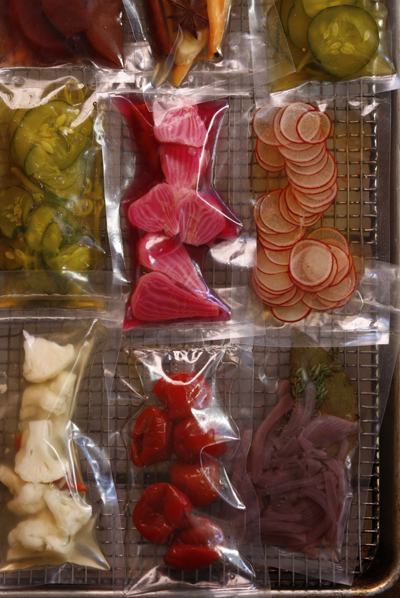 Supper’s Mitch Prensky brings pickling into the modern era
Supper’s Mitch Prensky brings pickling into the modern era
by Lee Stabert
Carrots with passion fruit, saffron and garlic with cauliflower, barigoule and artichokes, turnips with Herbes de Provence, spicy pickled vegetables for báhn mi, kosher dill pickles, okra with sage, preserved lemons and oranges, mushrooms, apples, Brussels sprouts, cauliflower, green beans and okra.
That is just a short list of the things Mitch Prensky is pickling at his restaurant Supper. No, he doesn’t have a bunker for all those jars—though they would look awfully pretty, lined up in colorful rows. Instead he takes an assist from vacuum technology, streamlining and even improving, this neglected food tradition.
Improving? Sounds like sacrilege, but the science behind his process has some interesting upsides. First off, there is the time factor. “The vacuum sealing extracts the air out of the mixture,” explains Prensky. “This breaks down the vegetable’s cell walls, forcing them to accept the pickling liquid.” The result: instead of waiting two or three days for something to pickle, he gets the same effect in 40 seconds.
Texture is also a huge upside. To seal jars properly, they have to be submerged in boiling water. The hot water ends up actually cooking the pickle slightly, so you get a softer pickle. “We can get the same result and the pickle is crunchier,” says Prensky. “It almost comes across as if it’s raw.” They use the same method with herbs and spinach—adding a little olive oil and vacuuming the greens. The result looks like it’s been blanched—it’s very green—but it’s still technically raw, preserving the vitamins and nutritional value.
Pickling can be a farm-to-table chef’s best friend—it helps mitigate the frustrations of seasonal eating. “You take a vegetable that’s really great and you say, ‘OK, how can I serve this out of season?’” says Prensky. “Like fiddlehead ferns and ramps—we pickle them. Then we can serve them in September or October. People say, ‘How can you have this out of season?’ Well, it’s a pickle—that’s why people did this in the first place. Before refrigerators, they needed it.”
Talking to Prensky, it’s clear that this stuff excites him. “I think my palate is very extreme,” he says. “I like really sweet stuff and I like really sour, bitter things, too. I really love the variety you can have when you’re making a pickle. You can pickle something with passion fruit, and you get something you wouldn’t expect. You can pickle something with curry. It adds another dimension to what we do here, which is handcrafted food. And, not wasting food, which is really important to me. You do a disservice to the people who grow the vegetables when you throw them out.”
As for the source of those vegetables, Supper has come up with a novel solution for this year’s growing season: They have contracted with a local farm to supply them exclusively. In February, Prensky sat down with the family that owns Blue Elephant Farm and their horticulturalist to make a list of the things they’d grow. (Some of his special requests: romanesco, arugula blossoms and baby corn for pickling.) “It’s really my dream come true—taking ‘farm to table’ to the nth degree,” enthuses Prensky. “We have them on retainer. And we’re also going to take all the extra food, pickle and preserve it, and give it back to the family.”
Prensky has embraced vacuum sealing for Supper’s pickles, but his openness to new technologies has its limits—the technique has to make the food taste better. “I’m not an inventor; I’m a chef,” he emphasizes. “What’s the best method? What’s the shortest distance between two points? Sometimes it’s vacuum sealing, sometimes it’s just plain old braising—cooking like grandma—sometimes it’s putting something over an open flame. They’re all valid techniques when used properly. I’m aware of things—I read a lot, and I try to learn and incorporate techniques to see if we can do something better with it. If it doesn’t come out better, I’m not interested.”
Supper, 926 South Street, supperphilly.com

